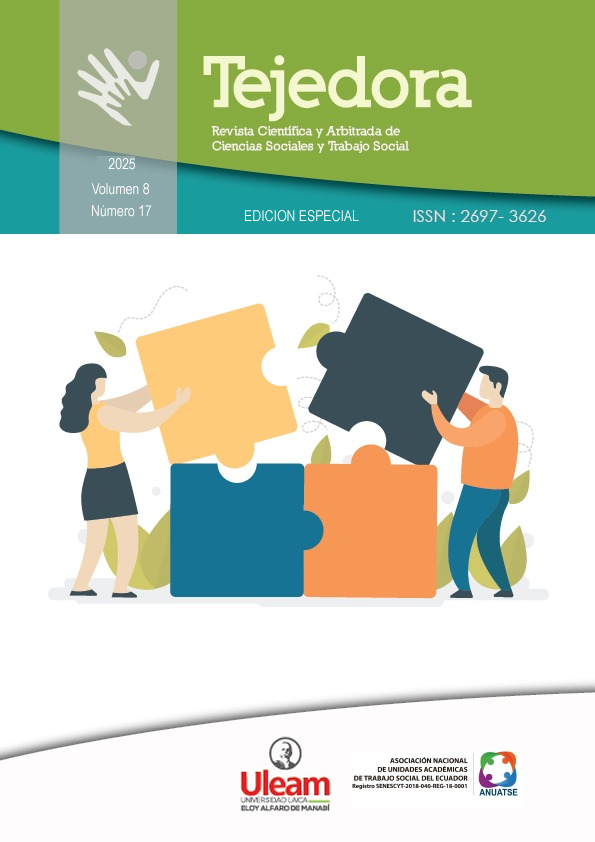PERSPECTIVE OF THE INFORMAL ENTREPRENEUR IN COMMUNITY TOURISM IN SALITRE CANTON, GUAYAS PROVINCE
DOI:
https://doi.org/10.56124/tj.v8i19.031Keywords:
informality, entrepreneur, community-based tourismAbstract
Informal tourism in Salitre represents a key challenge for authorities, businesses, and the community, as it affects the quality, competitiveness, and sustainability of community-based tourism. A study involving 50 local entrepreneurs identified urgent challenges: lack of specialized training in business management and service quality, complexity and costs of formalization procedures, and limited institutional support. It also highlighted the need to strengthen networks and alliances between entrepreneurs, organizations, and suppliers to share resources and expand markets. Finally, it proposes implementing awareness and outreach campaigns on the benefits of formalization and the value of community-based tourism, both locally and nationally, to improve the visibility and recognition of Salitre entrepreneurs.
Downloads
References
Dias, Á. S.‐R. (2020). Developing sustainable business models: local knowledge acquisition and tourism lifestyle entrepreneurship. . Journal of Sustainable Tourism, 931 - 950.
Huerta, S., Cortéz, A., Córdova, C., Ortiz, K., & Moya, M. (2024). Emprendimientos inclusivos como aporte en el turismo comunitario del Cantón Salitre, Provincia del Guayas. Polo del conocimiento, 1189-1204 (Edición núm. 92) Vol. 9, No 7.
Mintur. (27 de 05 de 2025). Ministerio de turismo Ecuador. Obtenido de https://servicios.turismo.gob.ec/turismo-en-cifras/balanza-turistica/
Qu, M. M. (2020). Community resourcefulness and partnerships in rural tourism. . Journal of Sustainable Tourism, 2371 - 2390.
Robalino-Villava, G. (27 de 05 de 2025). Repositorio UG. Obtenido de https://repositorio.ug.edu.ec/server/api/core/bitstreams/f2db7720-a9c2-4b64-b3d0-19cd62465f8f/content
• Admin, A., Campoverde, J. L. A., Pintado, R. P. Y., & Arroyo, K. E. R. (2022). Social and community entrepreneurship in the context of changes and crisis in Ecuador. Universidad Ciencia y Tecnología, 26(117), 98-108. https://doi.org/10.47460/uct.v26i117.665
Aquino, R. S. (2022). Community change through tourism social entrepreneurship. Annals of Tourism Research, 95, 103442. https://doi.org/10.1016/j.annals.2022.103442
Derks, M., Bidmon, C., & Ciulli, F. (2024). Circular e-waste ecosystems in necessity-driven contexts: The impact of formal institutional voids. En Business Strategy and the Environment (Vol. 33, Número 4, pp. 3733-3747). John Wiley and Sons Ltd. https://doi.org/10.1002/bse.3652
Huaraca Vera, L., Kang, M., & Echarri Chavez, M. (2021). Turismo comunitario: Del concepto a la gestión. La experiencia ecuatoriana: Community tourism: from concept to management. The ecuadorian experience. REVISTA CIENTÍFICA ECOCIENCIA, 8(6), 1-24. https://doi.org/10.21855/ecociencia.86.570
Huerta Cruz, S. Y. H., Gonzalez-Lovato, C. F. G., Pozo, M. B. M., & Franco, D. J. H. (2022). Estrategias de fortalecimiento basado en la matriz FODA. Caso de estudio de emprendimientos en la zona playera del cantón Salitre, Ecuador. 2022.
Jiménez, D. B., Cruz, V. H., & Conrado, R. (2017). AN ENVIRONMENTAL ANALYSIS FROM THE EDUCATIONAL PERSPEC- TIVE IN ECUADOR.
Leonov, Y., Dangadze, S., Chorna, O., Smentyna, N., & Fialkovska, A. (2024). Examination of strategies and tactics for crisis response in emergency situations. Multidisciplinary Reviews, 7(1), 2024spe018. https://doi.org/10.31893/multirev.2024spe018
Martinović, M. (2024). The API Model of Strategic and Tactical Marketing Thinking for Management Education. International Review of Management and Marketing, 14(6), 87-98. https://doi.org/10.32479/irmm.17099
Ngoasong, M. Z., & Kimbu, A. N. (2016). Informal microfinance institutions and development-led tourism entrepreneurship. Tourism Management, 52, 430-439. https://doi.org/10.1016/j.tourman.2015.07.012
Ortiz Chimbo, K. M., García Viteri, R. A., Huerta Cruz, S., & Sánchez Macías, R. E. (2023). Tourism micro-enterprises, an alternative for the sustainable development of tourism in the Salitre canton, Guayas Province: Nurseries, new undertakings. Journal of Business and Entrepreneurial Studie, 7(3). https://doi.org/10.37956/jbes.v7i3.346
Pérez, C. V., Álvarez, G. V., & Cruz, S. Y. H. (2025). El camino a la publicación de un artículo científico. 1.
Pesántez-Célleri, B. A., Erazo-Álvarez, J. C., Narváez-Zurita, C. I., & Moreno, V. P. (2020). Estrategias de emprendimiento para el turismo comunitario. Revista Arbitrada Interdisciplinaria Koinonía, 5(10), 806. https://doi.org/10.35381/r.k.v5i10.717
Quiñónez Bedón, M. F., Sarzosa Troya, M. C., & Razo Aguilera, S. P. (2024). El turismo comunitario sostenible en Ecuador: Un estudio diagnóstico del impacto de sus modelos. https://doi.org/10.5281/ZENODO.11122077
Sarmiento, L., & Esteban, D. (2019). Comercio informal, factores y políticas para su sostenibilidad caso de estudio, ropa mercado Feria Libre ciudad de Cuenca.
Skokic, V., Lynch, P., & Morrison, A. (2019). Veza: An informal network of tourism entrepreneurs. Annals of Tourism Research, 77, 26-37. https://doi.org/10.1016/j.annals.2019.05.004
Zhang, Y., Xu, H., Jia, R., Yang, H., & Wang, C. (2022). Realizing common prosperity: The action logic of social entrepreneurship community mobilization in rural tourism. Elementa: Science of the Anthropocene, 10(1), 00006. https://doi.org/10.1525/elementa.2022.00006
Zhovnirchyk, Y., Chernov, S., Larina, N., Lukashuk, M., & Antonova, L. (2023). Strategic Planning for the Sustainable Development of Territorial Communities. International Journal of Sustainable Development and Planning, 18(7), 2097-2105. https://doi.org/10.18280/ijsdp.180712
Published
How to Cite
Issue
Section
License
Copyright (c) 2025 Revista Científica y Arbitrada de Ciencias Sociales y Trabajo Social: Tejedora. ISSN: 2697-3626

This work is licensed under a Creative Commons Attribution-NonCommercial-ShareAlike 4.0 International License.






















